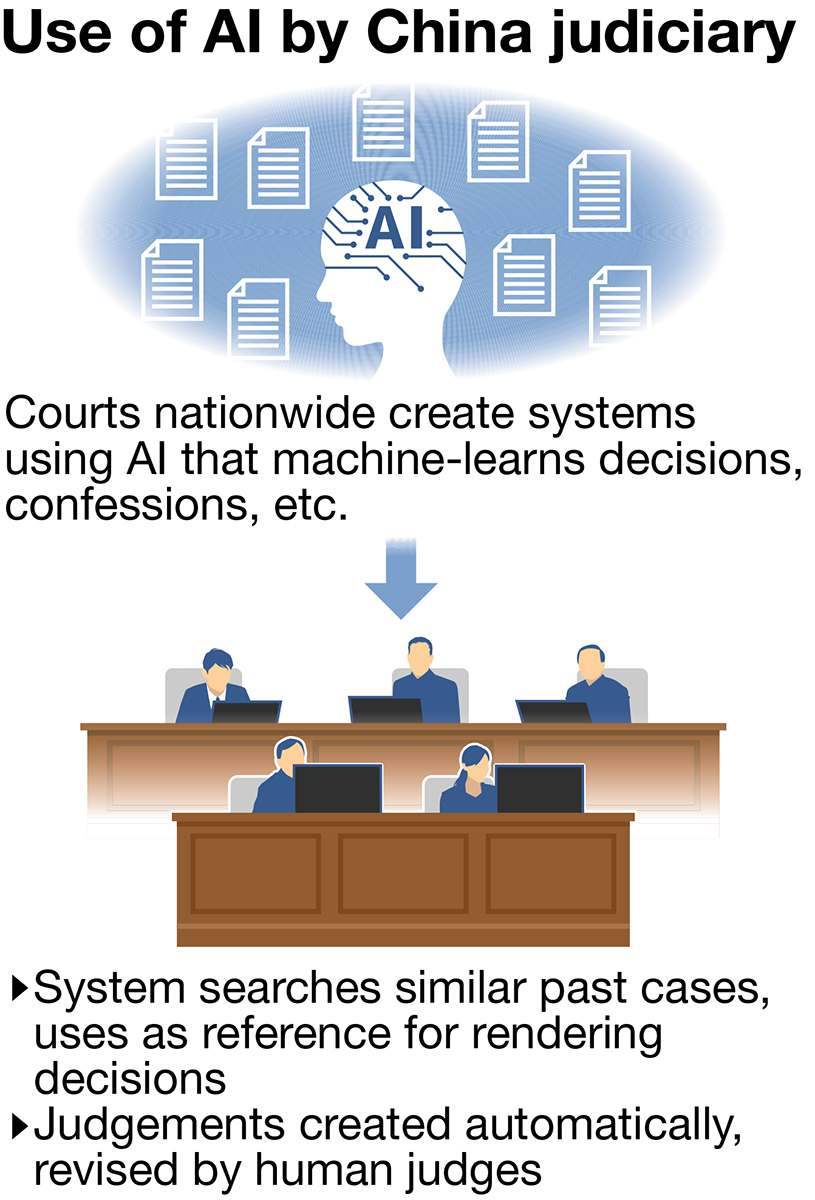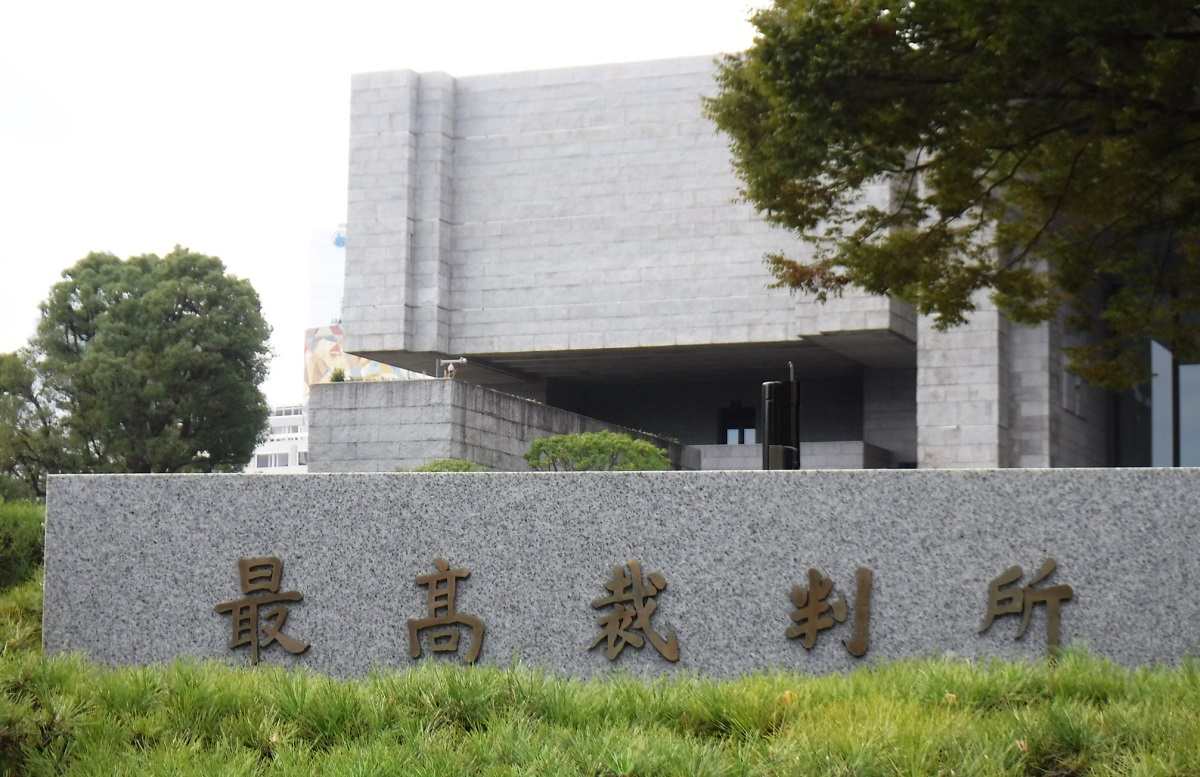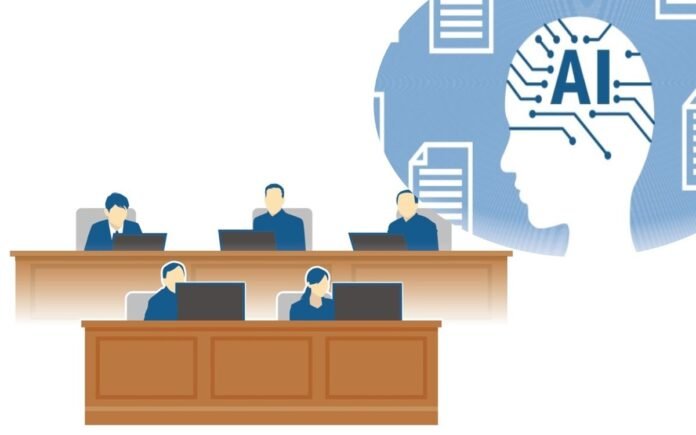The Beijing Supreme People’s Court, as seen in June
06:00 JST, August 6, 2024
BEIJING — A court clerk enters the details of a complaint in a financial civil case into a special system called the “future clerk,” and the judge presses a “create text” button. Within seconds, generative AI produces a rough draft of the decision.
The judge makes some changes, signs the document electronically, and the next day an official electronic version of the judgment is sent to the parties involved.
That was the outcome of the ruling in an April case at a court in Kunshan, Jiangsu province, as reported by Chinese media, as China continues to introduce artificial intelligence into the judiciary.
This pressure has raised concerns that AI learning under the country’s communist regime, which lacks an independent judiciary, will be based on biased case law and could be used to enable heavy-handed governance.
The Supreme Court, China’s highest court, wants all courts across the country to be equipped with AI by next year. AI can be used to prepare the text of rulings and examine evidence in court.
A system similar to Kunshan’s was introduced in the provincial capital of Suzhou in January, cutting the time judges spend reading court documents by 80 percent and reportedly cutting the time needed to process cases by a third.
AI systems are also being used in criminal cases. During a murder trial in a Shanghai court, the chief justice instructed the system to “indicate any discrepancies in the investigation materials” and the AI immediately displayed evidence.
The suspect denied in court that he had ever met the victim, but the courtroom screen showed the call logs of both victims from the past two years and a statement in which the suspect told investigators that the two had met. The suspect remained silent, but eventually admitted that the two knew each other.
Accelerated procedures
In late 2022, the Supreme Court ordered that courts across the country have AI systems in place by the end of 2025. The decision, the Supreme Court said, would speed up trials and ease the burden on judges, but was also intended to address public dissatisfaction with the government over a backlog of cases.
Last year, courts nationwide received a total of 45.57 million civil and criminal cases, of which 45.27 million were settled. The latter was an increase of 13.4% compared to the previous year, indicating that the introduction of AI is having an effect.
With bribery rampant in China’s judicial system, the introduction of AI may be intended to reduce the scope for bribed judges to make skewed decisions. Achieving a “clean judiciary” was one of the reasons cited by the Supreme Court for introducing AI systems.
Emphasis on ‘honesty’

In China, the judiciary is not independent, and it is unthinkable that an individual judge would make a decision that is not in line with the Communist Party committee assigned to the court. In the past, human rights lawyers and others critical of the regime have been jailed on charges of “inciting subversion of state power.”
A human rights lawyer in Beijing noted with concern that many citizens trust AI’s judgments more than those of human judges. He said: “The government wants people to accept conclusions that AI has drawn based on biased precedents, by emphasizing that AI makes ‘fair judgments.'”
Chinese authorities can use big data to analyze citizens’ purchasing behavior, interests and preferences.
“In cases where there is little evidence, using AI analysis of a person’s past actions in court could result in a verdict being passed that harms their rights,” said Hitotsubashi University Professor Kazuhiko Yamamoto, a specialist in civil procedure and the introduction of information technology into the judiciary.
***

The Supreme Court
The country’s Supreme Court is opposing the use of generative artificial intelligence in legal cases. This is because societal conflicts of all kinds are brought before the court and there are a thousand different ways to resolve them.
“Only human judges can make the final decisions, so it is difficult to imagine generative AI taking over that task,” a senior Supreme Court official said.
“I think it is still completely unacceptable to use generative AI to make judicial decisions,” Supreme Court Chief Justice Saburo Tokura said at a press conference ahead of Constitution Day on May 3.
He was concerned that the facts about various AI-related risks, such as copyright infringement due to the collection of vast amounts of data by AI, and bias in the material used to train AI systems, are still unclear.
He also said that it is of great importance to consider whether the use of generative AI for the work of judges can gain public understanding, taking into account both the pros and cons of such a move.
Courts handle criminal cases, problems between individuals and family matters, such as marriage and parent-child relationships, as well as disputes between companies.
“Sometimes we are faced with situations where unjust outcomes would result if we were to apply the law strictly according to precedent,” said a senior judge. “Generative AI based on past data can only provide general answers, so we cannot give it control over the core elements of legal cases.”
Generative AI is being considered for administrative procedures outside of investigations, as it is expected to make these tasks faster and more efficient. However, no concrete steps have been taken yet.
In an administrative notice sent to high courts and district courts across the country in July last year, the Supreme Court said: “In view of the latest scientific findings and risks, we must thoroughly study the use of generative AI for judicial functions.”



